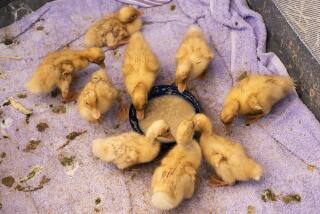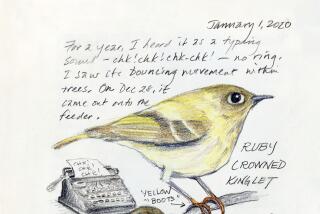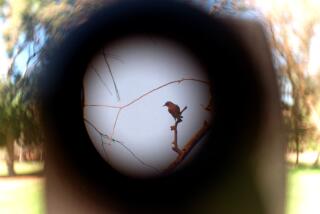Why a Duck? : LAST CHANCE TO SEE <i> By Douglas Adams and Mark Cawardine (Harmony Books: $19.95; 240 pp.) </i> : THE SEARCH FOR THE PINK-HEADED DUCK <i> By Rory Nugent (Houghton Mifflin: $19.95; 222 pp.) </i>
- Share via
Some years ago, I was an editor for Outside, a magazine that sometimes concerns itself with adventurous travel. Every Monday morning I found a mountainous stack of letters on my desk, usually accompanied by some sly note from the mail room.
“I am,” the letters read exactly and without exception, “a marathon runner and avid mountain climber. I propose to climb the highest mountain in Bali. Please send expenses to . . . “
Such missives generate especially vivid visions of scenes that never happened and never will. Several magazine editors, for instance, are planning their next issue. “Hey,” one of them says in a burst of inspiration, “I got a letter here from a guy who wants to climb the highest mountain in Bali. He needs $5,000.”
“Can he write?”
“Write? The guy’s a marathon runner and an accomplished mountain climber.”
In point of fact, editors are cruel, barely human men and women whose only concern is the kind of well written article or book that makes them look good.
Editors in the market for travel-oriented books do not care if the writer is an intrepid adventurer or an incompetent bumbler. They’re looking for good writing.
An especially illuminating example of this dictum is a compare-and-contrast session with Rory Nugent’s “The Search for the Pink-Headed Duck” and Douglas Adams’ newest opus, “Last Chance to See.” Nugent is dauntless and capable. Adams is, by his own admission, something of an unqualified, unskilled space case. Both men write well. Both books are informative and delicious. Adams is a good bit funnier, while Nugent enmeshes himself in funny situations: He is a man who seems inclined to make hazardous friendships that send him down rivers infested with animals that suck blood and men that spill it.
Adams, the author of what he calls “humorous science fiction” (“The Hitchhiker’s Guide to the Galaxy,” “The Long Dark Tea-Time of the Soul”), defines the nature of his quest in the first sentence of “Last Chance to See”: “This book is about a series of journeys that Mark Cawardine and I went on to look for some of the world’s rarest, most endangered animals . . . “
Adams travels to Indonesia to visit a pit of feeding Komodo dragons (giant meat-eating, man-eating monitor lizards); to Zaire for a session with the endangered mountain gorillas and a quick look at the white rhino; to China for a jaunt with the rare river dolphin, and to New Zealand, where he searches for the all-but-extinct kakapo, an extremely peculiar bird.
According to Adams, Mark Cawardine did all the preparation and research involved in mounting the trips. “He also,” Adams admits, “taught me most of the small amount I know about zoology, ecology and conservation work. All I had to do was . . . try to remember what happened long enough afterward to write it down.” Given that clear delineation of tasks, it seems extraordinary that Adams wanted to share a writing credit with Cawardine, who didn’t do any writing at all.
But then even the most cursory read of “Last Chance to See” suggests that Adams is a most generous man. The animals chronicled all are endangered in some way or another. Adams is concise in detailing the plight of each creature. This is life-or-death stuff, but Adams is a writer who chooses not to shake his finger at the reader. He fails completely in the self-righteous-piety department. Instead, he invites us to enter into a conspiracy of laughter and caring.
Adams refuses to manufacture emotions. He is not, for instance, a man who is tremendously excited about birds. Yet his description of the kakapo manages to combine comedy and poignancy in about equal measure. If this book were a novel, the kakapo, this “extremely fat” flightless parrot, would be considered a fully developed character, like Mr. Micawber.
New Zealand, Adams explains, had, until fairly recently, been populated almost entirely by birds. Because there were no predators-- no dogs, cats, ferrets, weasels-- many species abandoned flight altogether. The arrival of European settlers--along with dogs, cats, etc.--was the beginning of what might be the end for the kakapo.
The kakapo is, Adams writes, a “a bird out of time. If you look one in its large, round, greeny-brown face, it has a look of serenely innocent incomprehension that makes you want to hug it and tell it that everything will be all right, though you know that it probably will not be.”
Evolution has not graced the kakapo with the wit to flee New Zealand’s newly introduced predators. Worse, according to Adams, “the ways in which the kakapo goes about mating are wonderfully bizarre, extraordinarily long drawn out, and almost totally ineffective.” One conservation worker wonders aloud if the male’s booming mating call might actually repel the female, which, Adams notes, “is the sort of biological absurdity you otherwise find only in discotheques.”
Adams is laugh-out-loud funny, and I found myself calling friends long-distance to share some particularly hilarious paragraphs. The book is also menagerie of precious images, and as serious as life and death. I think it’s important.
Rory Nugent, like Adams, sets out on a quest, this one in search of the pink-headed duck, one of the rarest birds in the world. It was last sighted in India, 50 years ago.
Now, I am, like Douglas Adams, a man afflicted by the tragedy of ornithological dyslexia and really didn’t think I’d be much interested in a man who sold his New York apartment in order to finance a search for a bird that may already be extinct. I felt the comic nobility of the quest might strain my patience.
But no: Nugent plods on, against great odds, not the least of which is that nearly everyone he meets in India seems to be laughing behind his back if not directly in his face. The vendors at the fowl market in Calcutta try to sell him common ducks spray painted red; people refer to him as “the duck man.” He spends weeks in New Delhi waiting for official permission to travel in remote areas of India. A man who can make hours of dogged small talk with reluctant bureaucrats seem like rollicking adventure is a man who can write. He visits the ministry so many times that the guards a the door quack at him as he walks by.
Still, by dint of sheer persistence, Nugent prevails. The permits are issued. Nugent--this is a guy who’s only looking for a duck, understand--finds himself talking with displaced Tibetan lamas who want him to sneak into Tibet and take pictures of a supposed Chinese nuclear-waste dump there. He makes friends with the messianic leader of a Gurkha separatist movement and inadvertently accompanies a group of guerrillas who engage government soldiers in a fire fight. Finally, he purchases a small canoe-like boat and floats down the sacred Brahmaputra, a river that comes complete with pirates, leeches and crocodiles.
I finished “The Search for the Pink-Headed Duck” suffused with the kind of awe I ordinarily reserve for those souls who accomplish absurdly difficult feats for no readily explicable reason. However, in contrast to the majority of persons who have, for instance, done cartwheels across the state of Nebraska, Nugent is a deft writer with a self-deprecating sense of humor and a keen eye for detail.
Most of us, I suspect, are not nearly as self-reliant as is Rory Nugent. On the other hand, we’re all probably right up there somewhere on the competence scale with Douglas Adams. Now, what I suggest here is that editors everywhere require that any writer or would-be writer granted expenses for any travel at all must read both “Last Chance to See” and “The Search for the Pink-Headed Duck.” This may result in some wonderfully readable books and articles.
The major effect, however, would be that both Adams and Nugent would become rich enough to embark upon further adventures and produce a couple more books for me to savor and enjoy.
More to Read
Sign up for our Book Club newsletter
Get the latest news, events and more from the Los Angeles Times Book Club, and help us get L.A. reading and talking.
You may occasionally receive promotional content from the Los Angeles Times.










